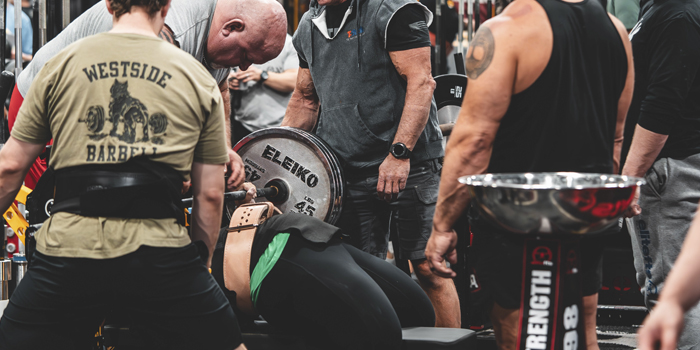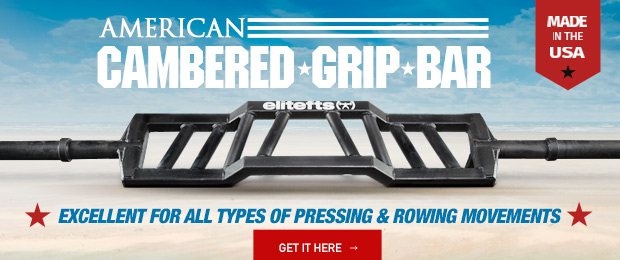
Speed work for bench press is not meant to be done forever. Let me tell you why. I did speed work, or dynamic method, for bench press for fifteen years. I first read about it in Powerlifting USA Magazine, Westside's Book of Methods, and elitefts ebooks.
Then, I continued to do it for the four years I trained REAL Westside. ("REAL" Westside means you either trained there or a member trained you; I did both.)
I did speed work week in and week out with a multitude of different bars. Fat bars, cambered bars, bench bars, squat bars, swiss bars, football bars, even to boards, flat, incline, decline, on the floor, with another multitude of accommodation resistance including chains, bands, and/or a combination of the two. I did this once a week, one of my two scheduled bench press days. For many, many years, I never missed a day.
READ MORE: Is Shirted Board Work Killing Your Bench Press?
If you have read my previous articles, you will know that when I trained REAL Westside, I developed a great squat, and my bench press went to hell. Actually, it went from a Canadian record-breaking 672.5 pounds to a barely passable 560 pounds.
My coach and I had no clue how to fix it. We even consulted with Lou, to no avail.
I finally had to make one of the hardest decisions of my life, and I made it right after I squatted 1,000 pounds and benched only 560 pounds at a meet in Newtown, PA.
It really bothered me how great my total could have been with that 1,000-pound squat if I had maintained my high 600s bench press.
Do What It Takes To Improve
I made a call and got myself invited to train at Adirondack Barbell Club (ABC) in Glens Falls, NY, with bench press guru Bill Crawford. Unfortunately, my Westside coach was not pleased, ultimately ending our four-year friendship. However, as powerlifters, most of us will do what needs to be done to improve, regardless. He saw it as me losing confidence in his training, and I saw it as the fact that I would never have a decent bench again unless I made a change.
As I said in my previous article, My Time Training Metal Militia Style at Adirondack Barbell, about training at ABC, Bill immediately removed me from speed work for my bench press. It was way more benching than my body could recover from, and in a moment, we will delve into the difference between too much work for beginners/intermediates and seasoned pro lifters.
Dynamic effort bench day, after 15 years of training it, week in and week out, was replaced by a day committed solely to tricep strength and a few other accessories like pecs, back, and delts in a bodybuilding style rep/set scheme. In a matter of weeks, my shoulder pain all but disappeared, and my shirted bench began to climb once again. I am not saying stopping speed work fixed everything because it did not. We also did some extremely grueling training for technique on shirt day, but it definitely contributed to my bench press being revived and to me narrowly averting a shoulder injury.
Dynamic Effort Bench Press For Beginner and Intermediates
The thing here is that the Dynamic Effort bench press is fantastic for beginner and intermediate lifters.
Does it make you fast and train you to recruit more muscle fibers? YES. Does it reinforce setup and bench pressing technique, bar path, and extremely important things like breathing? YES.
Was it a great tool to teach all of this to my clients and lifters at my gym? YES.
Was it still worth the time and effort and damage it did to my bench press and my body after fifteen years of doing it? NO.
Not Meant For Forever
After 25 competitive years in the sport, I no longer needed to reinforce those things, they were second nature, and the other thing is you cannot get infinitely faster. It is impossible. You will develop speed and explosiveness with it. Still, at some point, you will not become any quicker or more explosive. At this point, you would be fine with just maintaining by making Dynamic effort occasionally in training rather than beating your body to death with it, week after week.
Another issue with doing speed work constantly is the volume of work I was asking my body to do. With a nearly 700-pound bench press, you are pressing in the 300-pound plus realm, including the accommodating resistance, for six to nine sets of three, week after week, after week, plus your maximum effort day. Too much! You do not need that volume of work that often as a seasoned powerlifter- you just don't!
It took many changes and hard work, including dropping speed work for the bench press altogether, but I got my bench press back and then some. My point of this article is: do not lock yourself into one type of training or one particular coach. We are all different, and finding what works for you is the key to success and being the best powerlifter you can be genetically. Like Lou says in the Book of Methods, you must turn over all the rocks, you must try everything to find what works and what does not work for you as an individual and ultimately be your own coach. You know your body better than anyone, so only you can lead yourself to be the best lifter you can be. Just do not be scared to ask for help along the way.
Bio
Nathan Robertson is the previous owner of Amherst Powerlifting Club in Nova Scotia, Canada, and the current owner of Berserker Barbell in Saskatchewan, Canada. He competed for 25+ years in powerlifting, is an IPA Canada Chairman, and is an IPA and WPC International Judge. Nathan is one of only six 1000-pound squatters in Canada and a Top-10 overall Bencher in Canada. He is also a multiple IPA World Record Holder.











